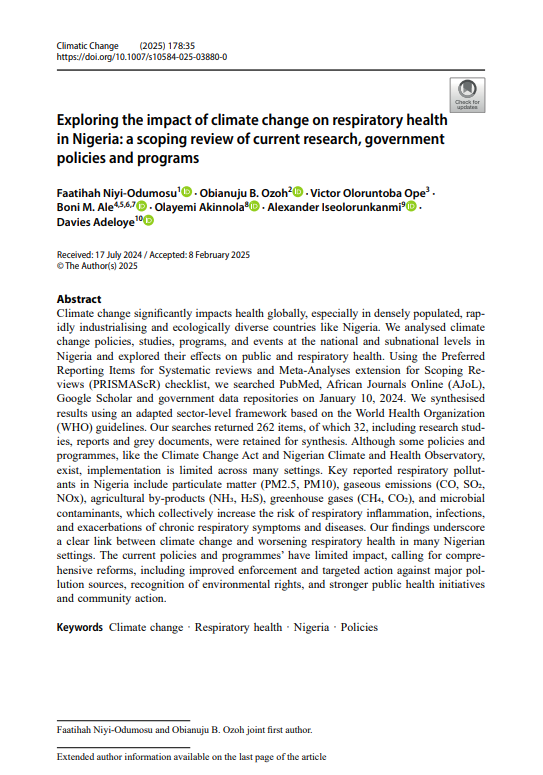Exploring the impact of climate change on respiratory health in Nigeria: a scoping review of current research, government policies and programs
Last Update : 10 Mar, 2025
Lay Summary
Climate change is making health problems worse worldwide, especially in fast-growing countries like Nigeria. We looked at government policies, research studies, and programs related to climate change and its impact on public and respiratory health in Nigeria.
To do this, we searched different research databases and government sources on January 10, 2024, following a structured review method. Out of 262 documents, we selected 32 that were most relevant.
Our findings show that Nigeria has some policies in place, like the Climate Change Act and the Nigerian Climate and Health Observatory, but their implementation is weak. Major air pollutants affecting respiratory health in Nigeria include:
- Fine particles (PM2.5, PM10) – Tiny dust and smoke particles that can enter the lungs.
- Gases (CO, SO₂, NOx) – Harmful fumes from vehicles, industries, and power plants.
- Agricultural emissions (NH₃, H₂S) – Chemicals released from farming activities.
- Greenhouse gases (CH₄, CO₂) – Gases that trap heat and worsen global warming.
- Microbial pollutants – Tiny germs that can cause infections.
These pollutants increase the risk of lung infections, asthma, and other breathing problems. Unfortunately, existing policies and programs are not strong enough to tackle these issues effectively.
To protect public health, Nigeria needs better enforcement of environmental laws, stronger pollution control measures, and more community involvement in climate action.
Abstract
Climate change significantly impacts health globally, especially in densely populated, rapidly industrialising and ecologically diverse countries like Nigeria. We analysed climate change policies, studies, programs, and events at the national and subnational levels in Nigeria and explored their effects on public and respiratory health. Using the Preferred Reporting Items for Systematic reviews and Meta-Analyses extension for Scoping Reviews (PRISMAScR) checklist, we searched PubMed, African Journals Online (AJoL), Google Scholar and government data repositories on January 10, 2024. We synthesised results using an adapted sector-level framework based on the World Health Organization (WHO) guidelines. Our searches returned 262 items, of which 32, including research studies, reports and grey documents, were retained for synthesis. Although some policies and programmes, like the Climate Change Act and Nigerian Climate and Health Observatory, exist, implementation is limited across many settings. Key reported respiratory pollutants in Nigeria include particulate matter (PM2.5, PM10), gaseous emissions (CO, SO₂, NOx), agricultural by-products (NH₃, H₂S), greenhouse gases (CH₄, CO₂), and microbial contaminants, which collectively increase the risk of respiratory inflammation, infections, and exacerbations of chronic respiratory symptoms and diseases. Our findings underscore a clear link between climate change and worsening respiratory health in many Nigerian settings. The current policies and programmes’ have limited impact, calling for comprehensive reforms, including improved enforcement and targeted action against major pollution sources, recognition of environmental rights, and stronger public health initiatives and community action.
Read Full Publication : https://link.springer.com/article/10.1007/s10584-025-03880-0

